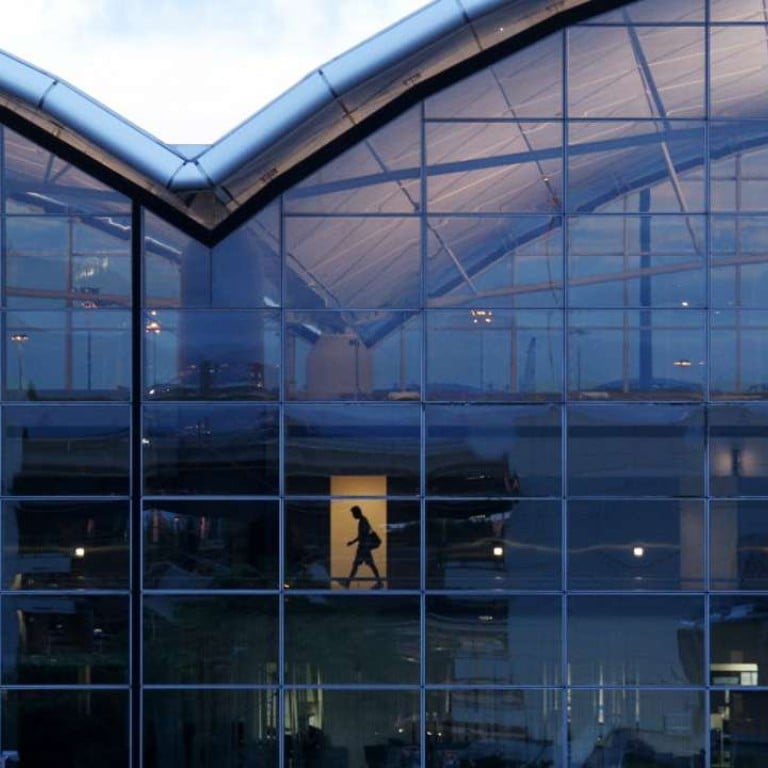
Hong Kong airport cuts back on bookshops: Page One out, new mainland-based operator takes over
A Beijing friendly chain moves in to replace the Singaporean and French operators at Hong Kong International airport
Hong Kong International Airport is cutting back sharply on the number of bookshops for departing passengers and replacing all Page One stores with new outlets run by a mainland-based firm.
The overhaul includes the replacement with high-end fashion stores of the airport’s two biggest bookshops in the departure area – once popular with mainland travellers buying books and magazines banned across the border.
At a time of major controversy over Hong Kong’s banned-book trade, the number of airport bookshops is being reduced from 16 to 10, and four remaining shops moved, mostly to smaller sites positioned near departure gates.
The two biggest bookshops – the 250 sq m Relay and Page One stores in prime positions near gates 20 and 21 in departures at Terminal One – are being replaced by luxury fashion stores MCM and Hermes respectively.
Airport book shops became a haven for all these controversial books about Beijing government officials and their sex lives and how they made their way [to power] through corruption
Singapore-based chain Page One has lost all six of its airport bookshops while French-owned Relay, which has been doing business at the airport for 11 years, has had its number of outlets cut from 10 to five.
Five of the 10 remaining bookshops at the airport will be run by a new operator, mainland publisher and bookstore chain Chung Hwa, under the new arrangement which comes into effect in April.
The cutback in book retail space has triggered concerns that the Airport Authority might have come under pressure to shut down shops selling politically sensitive titles or exercised self-censorship in the wake of the ongoing controversy.
Five Hong Kong booksellers went missing last year, sparking fears they had been kidnapped by mainland agents operating beyond their jurisdiction, but they later turned up on the other side of the border, saying they had gone there voluntarily in connection with an investigation into the smuggling and sale of banned books.
However, an Airport Authority spokeswoman said the decision had been taken to reduce bookstore space because of a “change in reading habit and advancement in technology” following regular customer surveys on travellers’ needs.
Relay and Page One were granted their most recent licences to run 16 bookshops at the airport in 2009. With the leases expiring in April, the Airport Authority invited bids for the relocated spaces in June last year and decided the winners in August.
A spokesperson for the marketing department of Page One Hong Kong declined to say if the chain lodged a bid but said: “The proposed units’ allocation for the latest tender offered by the Airport Authority [was] not appropriate for us to continue our presence.”
Because of that and the tourism downturn and sluggish economic conditions, Page One had decided to re-evaluate and restructure plans for retail stores to “match the current retail downturn”.
Lisa Leung Yuk-ming, associate professor from the department of cultural studies at Hong Kong’s Lingnan University, said Chung Hwa had “quite a strong mainland Chinese background” and people might surmise political reasons for the changes.
“Airport book shops became a haven for all these controversial books about Beijing government officials and their sex lives and how they made their way [to power] through corruption,” she said.
“They were a haven not only for books but for magazines publishing gossip tabloid stories about the mainland Chinese government.
“This might be a reprisal for bookshops selling these kind of things or it might be self-censorship by the airport themselves to try to weed out these problematic bookshop labels.
“It might be a more proactive strategy to let more pro-Beijing commercial presses have space at the airport as a way to toe the official line – [and say] these are the books you should be reading rather than these problem [ones].”
The Airport Authority spokeswoman repeatedly declined to address concerns over a possible political motive for the reduction in bookshop space.
“The selection of books to be offered in the shops is decided by bookstore operators,” she said.
The decision to cut back on book shops contrasts with the authority’s comments in 2009 when the previous contracts were awarded. Then, the authority said its surveys found books, magazines and newspapers were among the best-selling categories for departing passengers.

